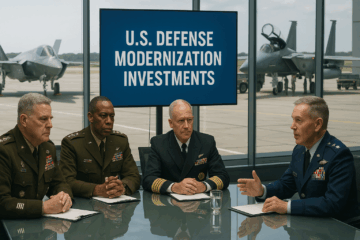The Red Sea has re-emerged as a vital fault line in the struggle for regional power, maritime security, and geopolitical leverage. At the center of this growing turbulence stand the Iran-backed Houthis in Yemen. Their increasingly bold attacks on international shipping as well as the showcasing of their ballistic missile capabilities, when launching attacks against Israel, transformed them from a local insurgency into a strategic threat with global ramifications. While President Donald Trump’s bombing of the Houthi’s led to a ceasefire against American shipping, it is not a permanent solution.
Current responses, ranging from US, UK, and Israeli airstrikes to maritime task forces, aim to degrade the Houthis’ operational capabilities. Except for recent American bombing efforts, they have fallen short of effectively neutralizing the group’s capacity to pose a critical threat to maritime trade in the Red Sea as well as the wider threat of destabilizing the region.
What it would truly take to dismantle the Houthi threat, in a sustainable and strategic manner, requires a multi-dimensional, coalition-led effort that combines kinetic force, strategic isolation, regional realignment, and political recalibration. Many of these key strategic components are still missing in the current response to the Houthis’ actions.
The Houthi Threat: Tactical Capabilities, Strategic Leverage
Beginning in 2023, the Houthis began escalating their attacks against civilian and military vessels in the Red Sea, the Bab el-Mandeb Strait, and even the Gulf of Aden—utilizing Iranian-supplied drones, cruise missiles, and unmanned suicide boats. These attacks achieved several objectives for the group and its backers in Tehran. First, the attacks successfully disrupted global shipping, raising insurance rates and negatively impacting Egypt’s Suez Canal, which saw a decrease of almost 60 percent of its annual revenue from $10.3 billion in 2023 to $4 billion in 2024. Second, the Houthis’ attacks provided a clear projection of Iranian deterrence without a confrontation with the US. Third, the attacks repositioned the Houthis as a pan-regional “resistance” actor, not merely a Yemeni faction.
Despite Israel’s effective strike on Yemen’s sea port of Hudaydah followed by another set of strikes a day later, including ones on the main airport in Sanaa, which probably prompted the Houthis to inform the US that they “don’t want to fight anymore,” the Houthi leadership still exists and their armed capabilities are far from degraded.
If anything is beneficial out of such ceasefire, it is only for the Houthis as it would ultimately allow them to reorganize their resistance and offensive capabilities. Furthermore, the Houthis’ obvious ballistic missile and drone capabilities pose a threat to Israel more than ever before.
The Inadequacy of Current Approaches
Western-led responses include airstrikes on Houthi launch sites, naval deployments like Operation Prosperity Guardian, and diplomatic pressure via the UN Security Council. Yet, these actions failed to produce long-term deterrence for four main reasons.
First, Arab states, especially Saudi Arabia, the United Arab Emirates (UAE), and Egypt, lack strategic unity regarding Yemen. Conflicting Arab views on how to engage the Houthi threat, along with differing opinions on the alignment of the US military response to the Houthis, are significantly limiting the effectiveness of the US efforts to degrade Houthi capabilities.
Second, Houthi adaptability and decentralized operations make targeting difficult. Houthi leadership, in several interviews, praised their unique structure and claimed it is different from that of Hamas and Hezbollah in terms of not relying on any communication technologies within the group and yet having a decentralized distribution in the mountains in Yemen.
Third, Iranian support continues uninterrupted through land and maritime smuggling. Reports from 2024 revealed that UN mechanisms failed to inspect most ships heading to Houthi-controlled ports.
Fourth, the proximity of civilian infrastructure to military targets limits the rules of engagement for Western forces. Furthermore, there is no insufficient political strategy to undercut Houthi legitimacy among Yemenis, and still, many of the Yemeni population appeal to the Houthi group. Based on the above, an effective strategy for neutralizing the Houthis’ capabilities requires escalation dominance across the military, economic, information, and political domains.
A Multi-Domain Campaign to Neutralize the Houthis
A shift to precision airstrikes by the United States was necessary, but more is needed. This includes high-value targeting of command-and-control (C2) nodes, drone operation sites, missile production sites, and technical assembly sites. Covert special operations strikes by Arab and American forces, to sabotage radar arrays, smuggling depots, and launchpads in areas like Al-Hudaydah and Sa’ada, is also needed.
Furthermore, border security cooperation from Oman is crucial in addition to placing an effective security cooperation framework with Eastern African states, where much of the Iranian weapons smuggling is taking place. Enforcement of naval dominance will occur through the establishment of exclusion zones in the Red Sea, supported by AEGIS destroyers and Gulf-based airpower.
Although the US Navy is taking the lead role in such functions, establishing a regional US-Arab naval cooperation is a key factor in eliminating the threats posed by the Houthis as well as further preventing the smuggling of weapons, missile components, and unmanned aerial vehicle (UAV) components to the Houthis via the sea. Cyber disruptions targeting the Houthis’ satellite navigation, drone-control networks, and internal communications is needed. This function is far more complex than it may appear, given that reports indicate that Russia supports the Houthis with targeting data.
Furthermore, it is also reported that the Houthi leadership coordinates directly with Chinese officials regarding safe passage for Chinese vessels. In addition to US sanctions against Chinese satellite and shipping firms, providing evidence that China’s technological support strengthens Houthi capabilities is needed.
Accordingly, effective US-Arab intelligence cooperation should be further enhanced to isolate Houthi access to foreign powers. This military approach must be continuous, not episodic, and paired with intelligence fusion centers involving the US, UAE, Saudi Arabia, and Egyptians.
Strategic Isolation of the Houthis from Iran
Without eliminating the Houthi connection to Tehran, no solution can succeed. This requires the interdiction of Islamic Revolutionary Guard Corps maritime routes, especially between the Bandar Abbas–Socotra–Horn of Africa corridor. Hence, the situation ultimately requires enhanced maritime domain awareness, including the use of satellites to ensure effective monitoring of vessels coming to Yemen, not to mention the essential need for regional security cooperation among all the nations surrounding these locations.
The financial isolation of the Houthis and associated members by pressuring banking entities and crypto exchanges that facilitate Iranian transfers to Houthis requires improvement. Continuously drying up the cash sources provided to the Houthis is a key factor in dismantling their operational capabilities. Additionally, increasing regional pressure on Oman to improve its border monitoring and security efforts is crucial for reducing overland routes used for arms and cash smuggling.
Overall, Iran’s support for the Houthis is part of its “ring of fire” doctrine. To dismantle this arc, the Houthis must be made a liability, not an asset, for Tehran.
Recalibrating the Regional Arab Response
Arab unity is a missing ingredient in the fight against the Houthis. A new Red Sea Defense Compact is required, comprising a joint command structure involving the US, UAE, Saudi Arabia, Egypt, Jordan, Bahrain, and, ultimately, Oman. Having a regional naval and airbase integration with a primary role for Egypt and Saudi Arabia would provide a forward-operating presence across the Red Sea. Given that Houthi disruption of Red Sea commerce and maritime passage directly threatens Egypt’s economic security, strategic re-engagement is particularly important. Such an arrangement would also create a strategic opportunity for a further deepening of US-Egypt defense cooperation and alignment of mutual regional interests.
The need for a Saudi-UAE reconciliation over Yemen’s future is essential, possibly via American mediation. Otherwise, even after neutralizing the Houthi threat, the region risks a politically unstable Yemen. If Arab states continue to act independently, they risk being played against each other, benefiting Iran and prolonging the conflict.
Dr. Mohamed ELDoh is a business development and consulting professional in the defense and security sector.
About the Author

Mohamed ELDoh
Dr. Mohamed ELDoh is a business development and consulting professional in the defense and security sector. Mohamed holds a doctorate degree from Grenoble École de Management - France, an MBA from the EU Business School-Spain, and an Advanced Certificate in Counterterrorism Studies from the University of St. Andrews, UK. He regularly authors articles addressing defense cooperation, counterterrorism, geopolitics, and emerging security threats in the Middle East and Africa.




The clash of cultures, politics and religions is on display. The question is, do you defeat your opponent playing by your rules or by using his? The essential philosophical point in any struggle, be it sports, debate, chess or war, is reaching the “tipping point” realizing you’ve reached it and then knowing when to push your opponent past it. There is no question that the Houthi view the West’s support of Israel as a basic violation of the laws and will of God. It is a point of absolutism that the West has to recognize and then deal with. The West has to deal with the Houthi from the view point of absolutism, to do less threatens the West ever achieving its goals and also it demeans and lessens the Houthi. Give the Houthi their due and treat them as they wish to be treated, as absolutists. The West needs to render an absolute solution on the Houthi that ends the issue.
Let’s make the Houthis our allies. End the Gaza ethnic cleansing campaign be executed by a maniacal regime. In fact, let’s have the Christians rule the Holy Land instead of subsidizing an ethno-state bent on war and rule by blackmail. This synagogue of satan is demoralizing and subverting western societies through their errors. We need to re-Christianize the West.
Our enemies spread usury and inflation. They corrupt culture through porn, prostitution, liberty without true freedom…. They poison us with gene therapy, so-called vaccines, and food additives. They lock in high energy costs through the green grift that leads to more pollution, less reliability, and increased monthly bills. They use fractional reserve banking and communistic capitalism for the monopolies and destroy small business. They use money printing to bail out their failures and take advantage of the inflation to control more assets, bring misery to families, and steal wages from laborers. They engineered and executed an invasion by our adversaries who wish us dead. All of the errors of those that reject Christ are choking Europe and America. Let’s get our own house in order and most likely the Arabian peninsula will let the traffic flow.
So why should we care about the Houthis, again?
Let’s have a truly America First strategy.
This article offers a compelling analysis of the accelerating Houthi threat in Yemen, notably emphasizing the dangers posed by their Iran-backed assaults on international shipping and their advancing ballistic missile capabilities.
I share your frustration with the current reactive responses and fully back your call for a coalition-led, multi-dimensional strategy. This military strategy should also leverage strategic isolation and regional cooperation. The argument for a unified Arab front that disrupts Iranian support is particularly powerful given the Houthis’ increasing regional influence.
That said, a few questions arise: How do you respond to skeptics who doubt the feasibility of synchronizing such a diverse coalition amidst entrenched geopolitical rivalries? What concrete measures can be implemented to ensure that a military response doesn’t inadvertently further destabilize Yemen? And in your view, how can Arab states overcome longstanding internal divisions to engage effectively against the Houthi threat?
Great piece. even better conversation starter. I’m curious to hear your thoughts on these points.